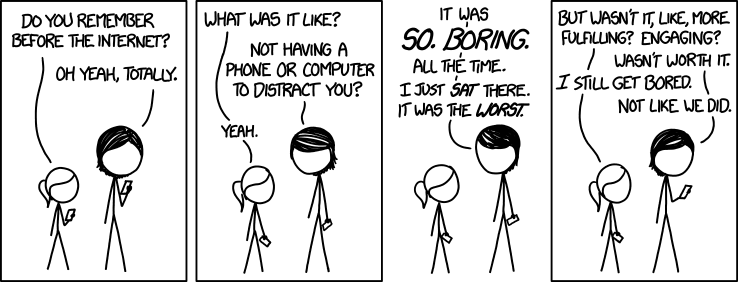Even boredom was better in the old days. The ability to stare at a phone and be updated with news or gossip via social media or reading emails while waiting for a bus. How about killing time by browsing endless images on Pinterest or selfies on instagram. We have the technology to fight boredom. Or rather we have the technology to ensure that our brains never really begin to get bored and space out.
So what? Boredom is bad, so using technology to prevent it must be good? But could there be an element that is lost along with the boredom of the pre-smartphone age? Is there something that happens to our minds when we are bored? Could it possibly be that by not filling our minds with quasi news or semi-personal connections that we may gain something?
At times I think that being bored allows our minds to wander, and from this point we may develop interesting new ideas. Was it this that Virginia Woolf (A Room of One’s Own, chapter 2) referred to when she wrote:
Yet it is in our idleness, in our dreams, That the submerged truth Sometimes Comes To the top.
Giving your brain time to process, bubble, draw connections, and finally present new ideas, thoughts and imaginative creations. Creativity requires boredom. Requires time where nothing happens, where everything is still.
I like the way Graham Lineham puts it
“I go up to my office and sit down in front of my computer and turn on the internet and then I don’t work – that’s the end of work for the day”. He laughs. “I have to use all these programs that cut off the internet, force me to be bored, because being bored is an essential part of writing, and the internet has made it very hard to be bored.”
Technology is a huge help, but it also must be overcome with discipline.
But there is also a problem when we mythologize our own childhood boredom as a fantastic learning experience. I would like to point out that most of us pre-Internet children did not go on to become creative geniuses. We were bored, we got over it. It didn’t make us great. In an article helpfully entitled Being bored at work can make us more creative; Dr Mann says: “Boredom at work has always been seen as something to be eliminated, but perhaps we should be embracing it in order to enhance our creativity.
Or maybe boredom will just make us unhappy.
